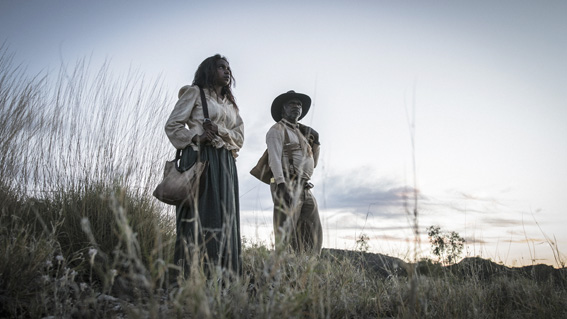![]() Because of its themes of racial animosity and the difficulty of achieving justice when one’s skin color differs from those in power, Sweet Country seems especially relevant to American audiences, even if it takes place in Australia in the late 1920s. Directed by Warwick Thornton, it boasts a mighty performance by Hamilton Morris as an Aboriginal man who is resilient and resourceful but overmatched.
Because of its themes of racial animosity and the difficulty of achieving justice when one’s skin color differs from those in power, Sweet Country seems especially relevant to American audiences, even if it takes place in Australia in the late 1920s. Directed by Warwick Thornton, it boasts a mighty performance by Hamilton Morris as an Aboriginal man who is resilient and resourceful but overmatched.
Set in the Outback, Sam Kelly (the aforementioned Morris) lives and works as a hired hand for Fred Smith (Sam Neill), a God-fearing man who enjoys reading scripture and has a relatively progressive view regarding race. One day, Smith is visited by a newcomer, Harry March (Ewen Leslie), an ex-soldier who needs help at his farm. From his choice of words and body language, we can tell March doesn’t share Smith’s high opinion of darker-skinned people, but nevertheless, he asks to hire Sam, his wife, Lizzie (Natassia Gorey-Furber), and their young niece for a day’s work. However, at his farm, March becomes abusive towards Sam and makes uncomfortable inquiries about the niece. After sending her husband away, March rapes Lizzie.
Lizzie remains silent about what happened, but the parties cross paths again not too long afterward: March goes on a rampage while attempting to find Philomac (Tremayne Doolan and Trevon Doolan), a biracial boy the ex-soldier had chained up under the suspicion that the youth was a thief. The boy has escaped, and a drunken March starts shooting up the house of Smith in retaliation. Smith had earlier left to go to town, leaving behind Sam and a terrified Lizzie. Grabbing his own gun, Sam shoots and kills March in self-defense, and he and his wife go on the run.
Thornton directs powerful moments with an assured hand, especially the scene in which March assaults Lizzie, filmed in a single take in which the man walks from one end of his living quarters to the other, slowly closing all of the windows. It’s too dark to see the actual assault, but we hear Lizzie screaming, the bed squeaking underneath them, and him shouting at her, all of which is brutal enough. Thornton’s other bold choices include flash forwarding to scenes that are disconnected from the main action that offer insights to the characters—of March, for example, privately raging at the world.
After the shooting, the film becomes a slow-burning game of cat-and-mouse through the wilderness, which includes forests, a desert, and up and around cliffs. The pursuers are led by Sergeant Fletcher (Bryan Brown), another erstwhile military man who has trouble keeping his frustration in check. His posse includes Smith, who goes along to make sure Sam is brought back alive; another Aboriginal hired hand, Archie (Gibson John), who witnessed the killing; and Kennedy (Thomas M. Wright), the farmer who employs both Archie and Philomac. How they relate to each other is established early on and has repercussions—in particular, that Fletcher distrusts Archie, as he distrusts all Aboriginal people.
The film provides salient commentary about cultural identity in a land colonized by Europeans: that non-whites lose theirs and as a result find themselves in an uneasy and unstable hierarchy in their homeland. A clear example involves Sam and Lizzie’s relationship to the tribes who live in the forest and mountains and have not been assimilated to white culture. These tribesmen view the two as outsiders. In addition, there is tension between Archie and Philomac when the former suspects his employer of favoring the boy over him.
Through it all, we easily sympathize with the main couple, especially the victimized Lizzie who finds her troubles further compounded during her and Sam’s escape. Meanwhile, in Morris, Thornton finds an actor with a terrific screen presence. His performance is stoic yet powerful.
Longtime an Australian star, Brown brings depth to Fletcher, a virulent racist who has a short fuse, but who also follows a military code of honor. Though he initially comes across as just an older version of March, his relationship with a woman bartender in town reveals an unexpected vulnerability. Neill also excels in the thankless role as the only reasonable white man around.
From the earliest scenes, which show Sam chained up like an animal in what amounts to a makeshift courtroom, we are primed for an unhappy ending. While the film is not so predictable, Thornton and screenwriters Steven McGregor and David Tranter err with an out-of-left-field surprise twist that feels like a cheat. Nevertheless, Sweet Country is a powerful drama boasting strong performances, an engrossing story, and a viewing experience not easily shaken off.







Leave A Comment